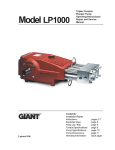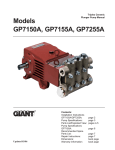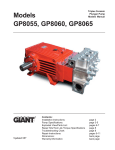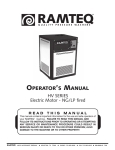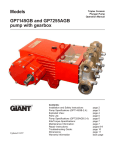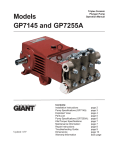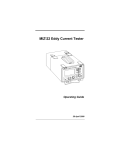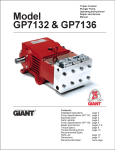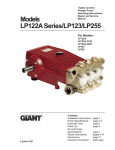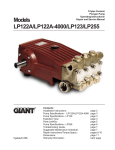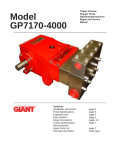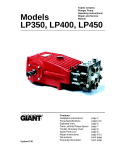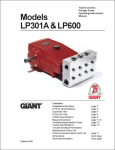Download Giant GP8155-R User's Manual
Transcript
GIANT INDUSTRIES LIMITED WARRANTY Giant Industries, Inc. pumps and accessories are warranted by the manufacturer to be free from defects in workmanship and material as follows: 1. For portable pressure washers and self-service car wash applications, the discharge manifolds will never fail, period. If they ever fail, we will replace them free of charge. Our other pump parts, used in portable pressure washers and in car wash applications, are warranted for five years from the dateof shipment for all pumps used in NON-SALINE, clean water applications. 2. One (1) year from the date of shipment for all other Giant industrial and consumer pumps. 3. Six (6) months from the date of shipment for all rebuilt pumps. 4. Ninety (90) days from the date of shipment for all Giant accessories. MODEL GP8155-R Triplex Ceramic Plunger Pump Model Manual WITH INTEGRAL GEARBOX 180o REVERSE This warranty is limited to repair or replacement of pumps and accessories of which the manufacturer’s evaluation shows were defective at the time of shipment by the manufacturer. The following items are NOT covered or will void the warranty: 1. Defects caused by negligence or fault of the buyer or third party. 2. Normal wear and tear to standard wear parts. 3. Use of repair parts other than those manufactured or authorized by Giant. 4. Improper use of the product as a component part. 5. Changes or modifications made by the customer or third party. 6. The operation of pumps and or accessories exceeding the specifications set forth in the Operations Manuals provided by Giant Industries, Inc. Liability under this warranty is on all non-wear parts and limited to the replacement or repair of those products returned freight prepaid to Giant Industries which are deemed to be defective due to workmanship or failure of material. A Returned Goods Authorization (R.G.A.) number and completed warranty evaluation form is required prior to the return to Giant Industries of all products under warranty consideration. Call (419)-531-4600 or fax (419)-5316836 to obtain an R.G.A. number. Repair or replacement of defective products as provided is the sole and exclusive remedy provided hereunder and the MANUFACTURER SHALL NOT BE LIABLE FOR FURTHER LOSS, DAMAGES, OR EXPENSES, INCLUDING INCIDENTAL AND CONSEQUENTIAL DAMAGES DIRECTLY OR INDIRECTLY ARISING FROM THE SALE OR USE OF THIS PRODUCT. THE LIMITED WARRANTY SET FORTH HEREIN IS IN LIEU OF ALL OTHER WARRANTIES OR REPRESENTATION, EXPRESS OR IMPLIED, INCLUDING WITHOUT LIMITATION ANY WARRANTIES OR MERCHANTABILITY OR FITNESS FOR A PARTICULAR PURPOSE AND ALL SUCH WARRANTIES ARE HEREBY DISCLAIMED AND EXCLUDED BY THE MANUFACTURER. GIANT INDUSTRIES, INC. 900 N. Westwood Ave. Toledo, Ohio 43607 (419) 531-4600 FAX (419) 531-6836 www.giantpumps.com Copyright 2008 Giant Industries, Inc. 4/08 GP8155-R.PMD Updated 4/08 Contents: Installation Instructions: Pump Specifications: Exploded View/Parts List: Repair Kits/Tool List:/Torque Specifications Troubleshooting Chart: Repair Instructions: Dimensions: Warranty Information page 2 page 3 pages 4-5 page 6 page 6 pages 7-10 page 11 back page INSTALLATION INSTRUCTIONS Installation of the Giant Industries, Inc., pump is not a complicated procedure, but there are some basic steps common to all pumps. The following information is to be considered as a general outline for installation. If you have unique requirements, please contact Giant Industries, Inc. or your local distributor for assistance. GP8155-R -- DIMENSIONS - (mm) 5. Crankshaft rotation on Giant Industries, Inc. pumps should be made in the direction designated by the arrows on the pump crankcase. Reverse rotation may be safely achieved by following a few guidelines available upon request from Giant Industries, Inc. Required horsepower for system operation can be obtained from the charts on page 3. 1. The pump should be installed flat on a base to a maximum of a 15 degree angle of inclination to ensure optimum lubrication. 6. Before beginning operation of your pumping system, remember: Check that the crankcase and seal areas have been properly lubricated per recommended schedules. Do not run the pump dry for extended periods of time. Cavitation will result in severe damage. Always remember to check that all plumbing valves are open and that pumped media can flow freely to the inlet of the pump. 2. The inlet to the pump should be sized for the flow rate of the pump with no unnecessary restrictions that can cause cavitation. Teflon tape should be used to seal all joints. If these pumps are to be operated at temperatures o in excess of 86 F, it is important to insure a positive head to the pump to prevent cavitation. The service life of the seals is maximized if a minimal amount of leakage is present. A few drops of water can drip from each plunger every minute. Leakage has to be examined every day; the plunger seals must be changed should leakage become excessive (=constant dripping). 3. The discharge plumbing from the pump should be properly sized to the flow rate to prevent line pressure loss to the work area. It is essential to provide a safety bypass valve between the pump and the work area to protect the pump from pressure spikes in the event of a blockage or the use of a shut-off gun. 4. Use of a dampener is necessary to minimize pulsation at drive elements, plumbing, connections, and other system areas. The use of a dampener with Giant Industries, Inc. pumps is optional, although recommended by Giant Industries, Inc. to further reduce system pulsation. Dampeners can also reduce the severity of pressure spikes that occur in systems using a shut-off gun. A dampener must be positioned downstream from the unloader. Finally, remember that high pressure operation in a pump system has many advantages. But, if it is used carelessly and without regard to its potential hazard, it can cause serious injury. 4. Run the pump dry approximately 10 seconds to drain the water before exposure to freezing temperatures. IMPORTANT OPERATING CONDITIONS Failure to comply with any of these conditions invalidates the warranty 5. The pump and cooling system must be emptied if there is a danger of frost. Note that travel wind, for example, can cause water in pumps fitted on open vehicles to freeze even if the outside temperature is above freezing point. 1. Prior to initial operation, add oil to crankcase so that oil level is between the two lines on the oil dipstick. DO NOT OVERFILL. Use Industrial synthetic gear lube oil (ISO VG 220), such as Mobil Gear 630, Shell Omala oil 220 or Texaco Meropa 220. Crankcase oil should be changed after the first 50 hours of operation, then at regular intervals of 200 hours or less depending on operating conditions. 6. Inlet pressure not to exceed 29 PSI when using the integrated oil cooling system. If using a separate cooling system (max. 29 PSI), the inlet pressure can be a maximum of 145 PSI. Run pump for one (1) min at ZERO PSI before operating under pressure. 2. Pump operation must not exceed rated pressure, volume, or RPM. A pressure relief device must be installed in the discharge of the system. To empty the cooling circuit, remove the L-joints (K11) on the pump head (50). Blow out the circuit liquid at the joint connection (K11/K7) using compressed air. 3. Acids, alkalines, or abrasive fluids cannot be pumped unless approval in writing is obtained before operation from Giant Industries, Inc. Pump fluid should be filtered to 300 micron. The torque tension on the valve casing nuts (49A) should be checked after approximately 200 operating hours. Please see page 7 for torque values. 2 11 GP8155-R PUMP REPAIR INSTRUCTIONS Specifications Model GP8155-R 15) Replace seal retainer (33), seal (32) and clip ring (33B). Seal (32) must always be installed so the seal lip on the inside diameter faces the oil. Possible axial float of the seal retainer (33) to be compensated with shims (33C). Re-assemble the seal sleeves (39) and plunger pipes (36B). Tighten the tension screw (36C) to 30 Ft-lbs. Replace valve casing and tighten hexagon U.S. (Metric) Volume ............................................................. Up to 74.8 GPM ...... (283 LPM) Discharge Pressure ......................................... Up to 2900 PSI ........ (200 bar) Speed ............................................................... Up to 580 RPM ....... 580 RPM Inlet Pressure ................................................... Up to 29 PSI ............ (2.0 bar) Plunger Diameter ............................................. 2.17” ........................ 55mm Plunger Stroke ................................................. 2.83” ........................ 72mm Crankshaft Diameter ....................................... 2.76” ........................ 70mm Key Width ........................................................ 0.55” ........................ 14mm Crankshaft Mounting ......................................................................... Either side Shaft Rotation .................................................................................... Top of pulley ........................................................................................................... Towards manifold Temperature of Pumped Fluids ........................ Up to 86 oF .............. (30 oC) Inlet Ports .......................................................................................... (2) 3" BSP Discharge Ports ................................................................................. (2) 1-1/4" BSP Weight .............................................................. 794 lbs. .................... (360kg) Crankcase Oil Capacity ................................... 3.7 Gal. .................... (14.0 liters) Fluid End Material ............................................ Nickle plated Spheroidical Cast Iron 16) Mount cooling plate (K1) and gear cover (K3) with their respective seals (K2). When assembling the cooling circuit line, make sure that the oil cooler connection (K7) is always joined to the upper connection (K3) of the gear cover. Heat ball bearings (74 and 75) first before pressing them on to the pinion. Press the cogwheel slightly on to the crankshaft so that the pinion (69) together with the ebaring (74) can be inserted. Move the pinion (69) against the cogwheel and make them mate perfectly when mounting. Then carefully tap the cogwheel and the pinion simultaneously on to the crankshaft and into the bearing seat. Fit fitting disc (69) and secure screw (72) with Loctite. Fit the seal (76) on to the cylindrical pins (68). Push the gear cover (66) carefully onto the bearing (75). Make sure that the radial shaft seal (73) does not get damaged during fitting onto the pinion. Before putting into operation again, turn the reduction gear shaft by hand at least four full turns to make sure the gear is correctly aligned. Consult the factory for special requirements that must be met if the pump is to operate beyond one or more of the limits specified above. GP8155-R HORSEPOWER REQUIREMENTS RPM 300 400 500 580 GPM 500 PSI 38.7 13.3 51.6 17.8 64.5 22.2 74.8 25.8 1000 PSI 2000 PSI 3000 PSI 26.7 53.4 80.1 35.6 71.2 106.8 44.5 89.0 133.4 51.6 103.2 154.8 SPECIAL NOTE: The theoretical gallons per revolution (gal/rev) is 0.129. To find specific outputs at various RPM, use the formula: HORSEPOWER RATINGS: The rating shown are the power requirements for the pump. Gas engine power outputs must be approximately twice the pump power requirements shown above. We recommend a 1.15 service factor be specified when selecting an electric motor as the power source. To compute specific pump horsepower requirements, use the following formula: GPM X PSI 1450 GPM = 0.129 x RPM 10 3 = HP EXPLODED VIEW - GP8155-R GP8155-R PUMP REPAIR INSTRUCTIONS To Dismantle Crankcase Gear 11) Take out plungers and seal sleeves as described above. Drain the oil by taking off the plug (12). After removing the clip ring (33B), lever out the seal retainer (33) and seal (32) with a screwdriver. Open hose adapter (K11) and remove gear cover (K3) by removing the socket head cap screws (K5). Remove the cooling vane plate (K1) by removing the screws (K4) Connecting rods are marked 1 to 3 for identification. Do not rotate connecting rod halves or interchange them. When re-assembling, the connecting rod must be fitted in their exact original position on the crankshaft journals. 14) Reassemble in reverse order. Replace the connecting rod and crosshead exactly as they were removed. Press the bearing ring (21) past the clip ring groove. Replace the shims (21C). Snap in the clip ring (19) and insert crankshaft from other side, then press in the roller bearing (20). Mount bearing cover (14) and tighten screws (17) to 64 Ft-lbs. Adjust axial play (clearance) on the crankshaft to minimum 0.1mm / 0.15mm using shims (21A/B). Connecting rods must sit exactly in the middle of the crankshaft journal. Mount connecting rod halves in the exact, original position and tighten to 37 Ft-lbs. The shaft should turn easily. Connecting rods must be able to move slightly sideways on the stroke journals. 13) Push connecting rod halves together with the crosshead as far as possible into the crosshead guide. Remove bearing cover (14). Begin dismantling of the reduction gear by removing screws (67). Press off gear cover (66) by screwing two screws into both threaded bores. Remove screw (72) and take off fitting disc (69). Remove cogwheel from shaft with a removal tool and take the crankshaft out of the crankcase by gently tapping it with a rubber mallet. Remove connecting rod (24) and crosshead (25) from crankcase. Remember that this assembly must be re-assembled exactly as it was removed. Check surfaces on connecting rods (24), crankshaft (22) and crosshead (25). Check the surfaces of the crosshead guides in the crankcase for any uneveness. 4 12) Remove the connecting rod screws (24). 9 GP8155-R PUMP REPAIR INSTRUCTIONS 8) Take out the seal case (38) from the valve casing (50) and check o-rings (38A) (if necessary secure two screwdrivers in the front o-ring groove to extract seal casing from valve casing). Coat seals with silicon grease before installing. 7) Be careful not to damage the seal sleeve (39) and pressure ring (41). Check the inner diameter of the pressure ring for wear and if necessary replace together with seals (40) and (42). Clean all parts. New parts should be lightly coated with silicon grease before installation. Insert the seal unit (40, 41, 42 43) into the sleeve. Push the ceramic plunger carefully through the seals from the crankcase side. If necessary, the seals can be held tightly using a suitable pipe support held on the other side of the seal sleeve. Mounting surfaces of the crankcase and the valve casing must be clean and free of damage. The components must lie exactly and evenly on one another. The same exactness applies for all centering positions in the crankcase, pressure and valve casing. 9) Coat the seal sleeve(39) lightly with anti-corrosive grease (e.g. molycote no.Cu-7439) in its fitted area towards the crankcase. Insert the seal sleeves in to their crankcase fittings. Coat the threads of the tension screw (36C) lightly with thread glue and insert it together with a new copper ring (36D) through the ceramic pipe. Turn the pump by hand until the plunger (25) rests against the plunger pipe. Tighten the tension screw at 30 Ft-lbs. Replacing Valve Casing: 10) Put seal cases (38) in the centering holes of the valve casing, then push valve casing carefully on to centering studs (50A). Tighten hexagon screws (49A) evenly and crosswise at 266 Ft.-lbs. The torque tension on the screws (49A) must be checked after 8-10 operating hours; the pump must be at zero pressure. Thereafter, the tension is to be checked every 200 operating hours. Thread glue must never come between the plunger pipe (36B) and centering sleeve (36E). Overtensioning of the plunger pipe by excessive tightening of the tension screw and/or dirt or damage on the mounting surfaces can lead to plunger pipe breakage. Insert the seal tension spring (45) and oring (39A) in to the seal sleeve (39). 8 Parts List - GP8155-R Item 1 2 3 4 5 6 7 8 9 10 11 12 13 14 16 17 18 19 20 21 21A 21B 21C 22 23 24 25 28 29 29A 29B 29C 29D 30 30A 30B 30C 30D 31 32 33 33A 33B 33C 34 36B 36C 36D 36E 38 38A 38B 39 39A 40 41 42 43 45 49 49A 50 Part 05410 06893 05411 05412 05413 05414 05381 05035 01009 05415 07102 06273 22929 05036 05037 05038 05039 05124 05416 05417 05042 05043 05113 05418 05419 05047 05048 05049 05051 07408 05420 05421 05422 05052 07225-0100 13136 08280 05050 07623 05058 05055 05056 05054 05059 05060 05280 05062 07665 06900 05283 13286 05281 05275 05066 07723 05276 05277 05278 05279 05072 05073 05074 Description Crankcase Oil Filler Plug Assy with Vent Rear Foot for Crankcase Front Foot for Crankcase Hexagon Socket Screw Hexagon Socket Screw Plug 3/8 for Oil Dipstick Oil Dipstick Assy O-Ring Plug M33*1.5 O-Ring Plug G3/8 Copper Washer Bearing Cover Closed O-Ring Hexagon Socket Screw M12 Spring Ring Clip Ring Tapered Roller Bearing Tapered Roller Bearing Fitting Disc Fitting Disc Fitting Disc Crankshaft For Turned Gear Fitting Key Conn-rod Assy Crosshead c/w Plunger Crosshead Pin Hexagon Screw Hexagon Nut Bracket 2 for Cooling Hose Support Clamp Bracket 1 for Cooling Hose Cover Plate Hexagon Screw Grommet Washer Splash Cover Eye Bolt Radial Shaft Seal Seal Retainer O-Ring Clip Ring Fitting Disc Oil Shield Plunger Pipe Tension Screw Copper Washer Centering Sleeve Seal Case O-Ring Support Ring Seal Sleeve O-Ring Compact Ring Pressure Ring Sleeve Sleeve Support Ring Seal Tension Spring Stud Bolt Hexagon Nut Valve Casing Qty 1 1 2 2 4 4 1 1 1 1 1 3 4 1 1 8 8 1 1 1 3 3 3 1 1 3 3 3 6 2 2 2 1 1 5 5 9 1 4 3 3 3 3 3 3 3 3 3 3 3 6 6 3 3 3 3 9 3 3 8 8 1 Item 5 Part Description 50A 50B 51 51A 51B 51C 51D 51E 51F 52 52A 52B 52C 52D 52E 52F 56 56A 57 57A 58 59 59A 60 61 62 62A 66 67 67A 68 69 13162 05075 05076 05077 05078 05079 07658 05080 05081 05082 05077 05084 05079 06258 05080 05081 05085 06258 05086 07210-0100 05087 07109 06272 06909 05088 05302 06934 05423 05424 07274 05425 05426 Centering Stud Discharge Casing Suction Valve Assy. Spring Tension Cap Suction Valve Seat Valve Plate O-Ring Valve Spring Valve Spring Guide Discharge Valve Assy Spring Tension Cap Discharge Valve Seat Valve Plate O-Ring Valve Spring Valve Spring Guide Discharge Valve Adaptor O-Ring Pressure Spring Pressure Spring Hexagon Socket Screw Plug G1/2 Copper Seal Plug G1 1/4 Plug G3 Plug G1/4 Copper Gasket Gear Cover Hexagon Screw Washer Cylinder Pin Gear Wheel Set (2200 RPM=3.8) Qty 70 72 07614 05427 Fitting Key 1 1 73 74 75 75A 76 77 78 79 80 81 K1 K2 K3 K4 K5 K6 K7 K8 K9 K10 K11 K12 K13 K14 K15 K16 05428 05429 05430 05431 05432 05433 05025 07662 07544 05434 05026 05027 05028 05029 07381 08041 05030 06272 07109 05120 05032 05033 05402 05435 05404 05436 Hexagon Screw Shaft Seal Ring for Gear Roller Bearing Roller Bearing Fitting Disc Gear Seal Flange c/w Gear Oil Cooler Mounting Aid for Valve Hexagon Socket Screw M8 Hexagon Socket Screw Cooling Vane Plate Seal for Gear Cover Gear Cover Hexagon Hd Cntrsnk Screw Hexagon Socket Screw Washer Connection for Oil Cooler Copper Seal Plug G1/2 Connecting Branch U-Joint Connector c/w Nut Tube for Cooler Hose Clamp Hose Guard Hose Coupling Nut Flat Gasket 1 1 1 1 1 2 1 1 1 1 9 1 2 1 8 8 8 1 6 2 3 3 2 4 2 1 4 2 1 3 3 3 3 3 3 3 3 3 3 3 6 3 3 3 3 3 3 12 2 2 1 1 6 6 1 10 10 4 GP8155-R PUMP REPAIR INSTRUCTIONS GP8155-R PUMP REPAIR KITS Item 38A 39A 40 42 Part # 13286 05066 07723 05277 Description O-Ring O-Ring Seal Ring V-Sleeve Item 51B 51C 51D 51E 51F 56A Qty. 6 6 3 9 Part # 05058 05056 Part # 05078 05079 07658 05080 05081 06258 Description Inlet Valve Seat Valve Plate O-Ring Valve Spring Valve Spring Guide O-Ring Qty. 1 1 1 1 1 3 Discharge Valve Kit - #09588 Oil Seal Kit - #09584 Item 32 33A Valve Inspection and Repair Inlet Valve Kit - #09587 Plunger Packing Kit #09616 Description Radial Shaft Seal O-Ring Item Part # 52B 05084 52C 05079 52D/56A 06258 52E 05080 52F 05081 Qty. 3 3 Description Discharge Valve Seat Valve Plate O-Ring Valve Spring Valve Spring Guide Qty. 1 1 2 1 1 1) Remove socket head cap screws (58) 2) Lift discharge casing (50B) up and away. 3) Take out pressure springs (57A). Pull out assembled valves (51 & 52) with valve puller. GP8155-R TOOL LIST AND TORQUE SPECIFICATIONS Item 17 24 33B 36C 49A Part # 05038 05047 05054 05062 05073 51-52 Description Hexagon Socket Screw Connecting Rod Hex. Hd. Socket Screw Clip Ring Tension Screw Hexagon Nut (Manifold) 05076-05082 Valve Assemblies Torque Ft-Lbs (NM) 64 (87) 37 (50) N/A 30 (40) 265 (360) N/A 58 K5 05087 07381 132 (180) N/A Hexagon Socket Screw Hexagon Socket Screw Tool Needed 10mm Allen Wrench 8mm Allen Wrench Industrial Snap Ring Pliers 16mm Socket 30mm Socket Valve Puller (p/n 07662) Included w/pump 12mm Allen Wrench 8mm Allen Wrench 4) Remove valve assembly (52) from discharge valve adapter (56) by gently twisting apart. The spring tension cap (51A, 52A) is screwed together with the valve seat (51B or 52B). Screw off spring tension cap. Takeout springs (51E, 52E) and valve plate (51C, 52C). Check sealing surfaces and O-rings (51D, 52D). Replace worn parts. Coat threads of valve seat with silicon grease or molycote anti-seize Cu-7439 when reassembling. Before refitting the valves, clean the sealing surfaces in the casing and check for any damage. Coat o-rings (51D, 52D & 56A) with silicone grease to help with re-assembly. Replace valve assembly (51) and pressure spring (57). Assemble valve assembly (52) to discharge valve adapter (56) by tapping together lightly with rubber mallet. While replacing the valve assemblies use a rubber mallet to tap the top of the valve puller lightly. This insures proper seating. Replace pressure spring (57A) and the discharge casing (50B). Tighten caps (58) at 133 Ft-lbs; check torque tension after 8-10 operating hours. GP8155-R TROUBLESHOOTING Problem Pressure Drops, water leaks Cause V-sleeves leak Pressure drops, pump gets loud Discharge or suction valve leaks Steam formation (Cavitation) Irregular pressure Worn Valves O-ring on valves or inlet valve adapter leaks Oil leaks at visible part of plunger Gear sealing is leaking Dirty, milk-colored or frothy oil Water has mixed with oil Oil leakage on the crankshaft Noise increases without the loss Shaft seal ring leaks Worn bearing Solution Replace V-sleeves, check surface of plunger Replace valve(s) Reduce suction height, reduce flow resistance in inlet line, clean inlet filter, lower water temperature. Examine valves Examine O-rings, check valve casing for unevenness on the sealing surfaces Examine seals and running surface of plunger Replace oil immediately, find & fix the cause Check seal and shaft Dismantle gear, examine all parts, replace worn parts, check oil level. If service life was too short, check for excess strain or whether lubrication intervals were too long. Only specified lubricants are to be used. To Check Seals and Plunger Pipe 5) Remove hexagon nuts (49A) and valve casing together with seal case (38) from crankcase (1). If necessary, carefully tap the valve casing (50) past the centering stud (50A) using a rubber hammer. IMPORTANT! If necessary, support the valve casing by resting it on wooden blocks or by using a pulley. 6) Remove tension screw (36C) and take seal sleeve (39) together with all mounted parts out of the drive. Pull plunger pipe (36B) out of the seal assembly and check for any damage. Carefully, remove seal rings (40) and sleeves (42) with a screwdriver. 7 6






